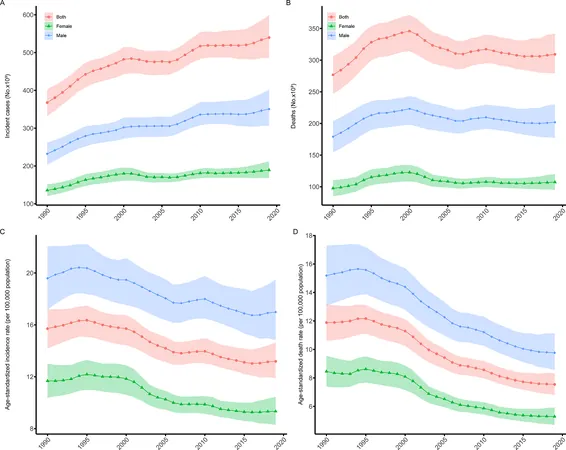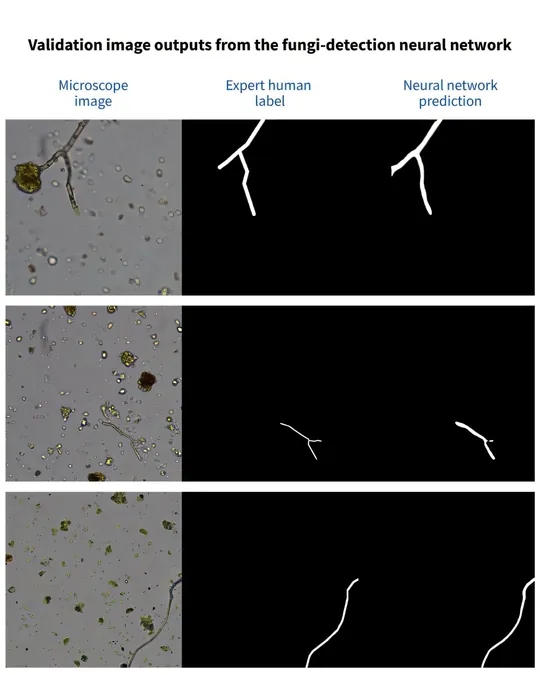
Unveiling the Alarming Rise of Early-Onset Gastrointestinal Cancers: A Comprehensive Global Report
2025-06-02
Author: Arjun
A Groundbreaking Study on Gastrointestinal Cancers
In a revealing analysis using data from the GBD 2019 database, researchers have exposed the worrying trends related to early-onset gastrointestinal (EO-GI) cancers affecting individuals aged 15 to 50. This comprehensive report highlights a significant increase in both incidence and mortality rates globally over nearly three decades.
Understanding Early-Onset Gastrointestinal Cancers
Early-onset gastrointestinal cancers encompass various malignancies including colorectal cancer (CRC), esophageal cancer (EC), and pancreatic cancer (PC), among others. This study categorizes data from an extensive range of countries, analyzing trends and patterns based on social-developmental indices (SDI), which gauge a region’s development progress.
Staggering Statistics on Incidence and Mortality
From 1990 to 2019, worldwide EO-GI cancer cases surged from 367,740 to 539,750, while deaths rose from 276,820 to 309,200. Contrarily, the overall age-standardized incidence rates (ASIR) and mortality rates (ASDR) showed a decline, indicating improved detection and treatment efforts. Notably, men saw a 51.03% jump in new cases, while women experienced a 56.12% increase.
Regional Insights: East Asia at the Forefront
East Asia emerged as a region of concern, reporting the highest ASIR and ASDR for EO-GI cancers in 2019. In sharp contrast, regions like Central Europe witnessed declines in both metrics. The data underscores the need for robust cancer care systems, particularly in lower SDI areas where underreporting remains a significant issue.
The Rising Threat of Specific Cancers
Among the key players, EO-CRC reached staggering statistics with 225,740 new cases in 2019. Its mortality rates are closely followed by those of EO-SC. Alarmingly, EO-PC exhibited the highest growth rates, suggesting potential latent health crises that require immediate attention.
Unpacking the Risk Factors at Play
The study highlights that smoking retains its role as the predominant risk factor for EO-GI cancers, despite a downward trend in its prevalence. Other contributors, such as high body mass index and dietary habits, are accelerating the incidence rates. Areas with improved living standards and health awareness are witnessing a unique increase in cancer burden, contrasting with global declines.
A Call for Action and Future Implications
This extensive analysis not only sheds light on the current landscape of early-onset GI cancers but also calls for urgent action to address rising incidence rates. With lifestyle modifications and enhanced detection methods, healthcare systems globally can work towards reducing the escalating threat of these cancers in younger populations.
Conclusion: A Message of Vigilance
As the data indicates a complex interplay of risks and healthcare access, it is crucial to strategize preventive measures and drive research to further dissect the evolving nature of EO-GI cancers. The findings compel us to remain vigilant, advocating for policy changes and modifications in public health approaches to combat this growing concern.




 Brasil (PT)
Brasil (PT)
 Canada (EN)
Canada (EN)
 Chile (ES)
Chile (ES)
 Česko (CS)
Česko (CS)
 대한민국 (KO)
대한민국 (KO)
 España (ES)
España (ES)
 France (FR)
France (FR)
 Hong Kong (EN)
Hong Kong (EN)
 Italia (IT)
Italia (IT)
 日本 (JA)
日本 (JA)
 Magyarország (HU)
Magyarország (HU)
 Norge (NO)
Norge (NO)
 Polska (PL)
Polska (PL)
 Schweiz (DE)
Schweiz (DE)
 Singapore (EN)
Singapore (EN)
 Sverige (SV)
Sverige (SV)
 Suomi (FI)
Suomi (FI)
 Türkiye (TR)
Türkiye (TR)
 الإمارات العربية المتحدة (AR)
الإمارات العربية المتحدة (AR)